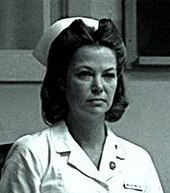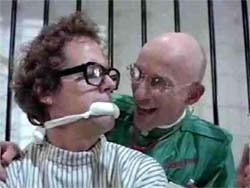It was starting to end, after what seemed most of eternity to me.
I attempted to wriggle my toes, succeeded. I was sprawled there in a hospital bed and my legs were done up in plaster casts, but they were still mine.
I squeezed my eyes shut, and opened them, three times.
The room grew steady.
Where the hell was I?
Then the fogs were slowly broken, and some of that which is called memory returned to me. I recalled nights and nurses and needles. Every time things would begin to clear a bit, someone would come in and jab me with something. That’s how it had been. Yes. Now, though, I was feeling halfway decent. They’d have to stop.
Wouldn’t they?
The thought came to assail me: Maybe not.
Some natural skepticism as to the purity of all human motives came and sat upon my chest. I’d been over-narcotized, I suddenly knew. No real reason for it, from the way I felt, and no reason for them to stop now, if they’d been paid to keep it up. So play it cool and stay dopey, said a voice which was my worst, if wiser, self.
So I did.
A nurse poked her head in the door about ten minutes later, and I was, of course, still sacking Z’s. She went away.
By then, I’d reconstructed a bit of what had occurred.
I had been in some sort of accident, I remembered vaguely. What had happened after that was still a blur; and as to what had happened before, I had no inkling whatsoever. But I had first been in a hospital and then brought to this place, I remembered. Why? I didn’t know.
However, my legs felt pretty good. Good enough to hold me up, though I didn’t know how much time had lapsed since their breaking – and I knew they’d been broken.
So I sat up. It took me a real effort, as my muscles were very tired. It was dark outside and a handful of stars were standing naked beyond the window. I winked back at them and threw my legs over the edge of the bed.
I was dizzy, but after a while it subsided and I got up, gripping the rail at the head of the bed, and I took my first step.
Okay. My legs held me.
So, theoretically, I was in good enough shape to walk out.
I made it back to the bed, stretched out and thought. I was sweating and shaking. Visions of sugar plums, etc.
In the State of Denmark there was the odor of decay….
It had been an accident involving an auto, I recalled. One helluva one….
Then the door opened, letting in light, and through slits beneath my eyelashes I saw a nurse with a hypo in her hand.
She approached my bedside, a hippy broad with dark hair and big arms.
Just as she neared, I sat up.
 “Good evening,” I said.
“Good evening,” I said.
“Why – good evening,” she replied.
“When do I check out?” I asked.
“I’ll have to ask Doctor.”
“Do so,” I said.
“Please roll up your sleeve.”
“No thanks.”
“I have to give you an injection.”
“No you don’t. I don’t need it.”
“I’m afraid that’s for Doctor to say.”
“Then send him around and let him say it. But in the meantime, I will not permit it.”
“I’m afraid I have my orders.”
“So did Eichmann, and look what happened to him,” and I shook my head slowly.
“Very well,” she said. “I’ll have to report this….”
“Please do,” I said, “and while you’re at it, tell him I’ve decided to check out in the morning. ”
“That’s impossible. You can’t even walk – and there were internal injuries….”
“We’ll see,” said I. “Good night.”
She swished out of sight without answering.
So I lay there and mulled. It seemed I was in some sort of private place – so somebody was footing the bill. Whom did I know? No visions of relatives appeared behind my eyes. Friends either. What did that leave? Enemies?
I thought a while.
Nothing.
Nobody to benefact me thus.
I’d gone over a cliff in my car, and into a lake, I suddenly remembered. And that was all I remembered.
I was….
I strained and began to sweat again.
I didn’t know who I was.
But to occupy myself, I sat up and stripped away all my bandages. I seemed all right underneath them, and it seemed the right thing to do. I broke the cast on my right leg, using a metal strut I’d removed from the head of the bed. I had a sudden feeling that I had to get out in a hurry, that there was something I had to do.
I tested my right leg. It was okay.
I shattered the cast on my left leg, got up, went to the closet.
No clothes there.
Then I heard the footsteps. I returned to my bed and covered over the broken casts and the discarded bandages.
The door swung inward once again.
Then there was light all around me, and there was a beefy guy in a white jacket standing with his hand on the wall switch.
 “What’s this I hear about you giving the nurse a hard time?” he asked, and there was no more feigning sleep.
“What’s this I hear about you giving the nurse a hard time?” he asked, and there was no more feigning sleep.
“I don’t know,” I said. “What is it?”
That troubled him for a second or two, said the frown, then, “It’s time for your shot.”
“Are you an M.D. ? “ I asked.
“No, but I’m authorized to give you a shot.”
“And I refuse it,” I said, “as I’ve a legal right to do. What’s it to you?”
“You’ll have your shot,” he said, and he moved around to the left side of the bed.
He had a hypo in one hand which had been out of sight till then.
It was a very foul blow, about four inches below the belt buckle, I’d say, and it left him on his knees.
“ !” he said, after a time.
“Come within spitting distance again,” I said, “and see what happens.”
“We’ve got ways to deal with patients like you,” he gasped.
So I knew the time had come to act.
“Where are my clothes?” I said.
“ !” he repeated.
“Then I guess I’ll have to take yours. Give them to me.”
It became boring with the third repetition, so I threw the bedclothes over his head and clobbered him with the metal strut.
 Now the authors of the U. S. Constitution were far from perfect – to put it mildly. But they would never have dreamed of claiming that they were giving people rights. Alexander Hamilton, for example,
Now the authors of the U. S. Constitution were far from perfect – to put it mildly. But they would never have dreamed of claiming that they were giving people rights. Alexander Hamilton, for example,